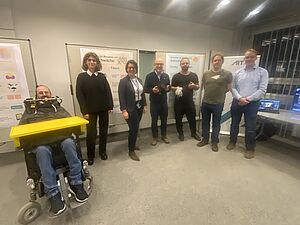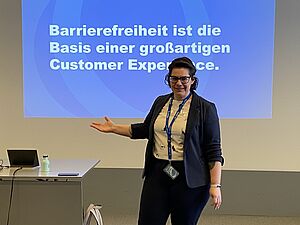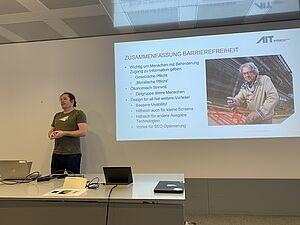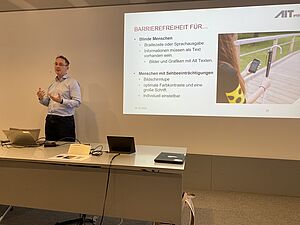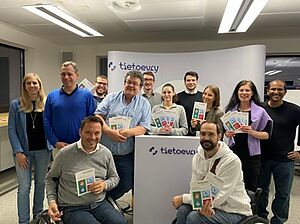
The AIT Centre for Technology Experience conducts research and several projects in the field of digital accessibility and is one of the pioneers in Austria with several Certified Web Accessibility Experts. How can we ensure an inclusive customer experience and digital accessibility for customer services? What is the legal situation regarding digital accessibility and what options are there for making digital services accessible? What research projects and innovations are there and what is being researched at the AIT on the topic of digital accessibility?
In December, the AIT Centre for Technology Experience held an "Accessibility Awareness Day" for employees on behalf of UNIQA. Georg Regal, Andreas Sackl, Ferdinand Glück, Katja Gallhuber and Christine Wahlmüller-Schiller from the AIT Centre for Technology Experience were on site. Tina Thron, Head of Digital Customer Experience at UNIQA, emphasised how important it is to give everyone access to information. Her goal for the event was to make participants from a wide range of UNIQA departments aware of how they can make products, services and channels as accessible as possible.
Lots of interest at UNIQA Accessibility Day
AIT's long-standing partner, the Hilfsgemeinschaft der Blinden und Sehschwachen, which has already realised several research projects with the AIT Center for Technology Experience, also took part. AIT experts Georg Regal and Andreas Sackl first provided comprehensive information in two presentations on the topic of digital accessibility and on research projects such as OptiVID (video player for visually impaired people) and the current BeauCoup project (Building Active User Experience to Bring Culture to the People). Afterwards, UNIQA employees were able to test for themselves at demo stations why digital accessibility is important: for example, with special glasses that simulate how blind or visually impaired people perceive websites, apps or online videos, demonstrated by Daniele Marano from the Hilfsgemeinschaft, and experience reports and practical tips for accessibility from Gerhard Nussbaum from the IT Competence Network for the Promotion of Integration of People with Disabilities (KI-I).
Using a special age simulation suit (weights on arms and legs impair mobility) and gloves that use electricity to simulate trembling hands, participants were able to experience how difficult it suddenly is to operate an app or type a message on a mobile phone. Under the guidance of Andreas Sackl, all participants were also able to test the OptiVID video player on site.
Conclusion of the participants: Digital accessibility is not only important for legal reasons (the EU Accessibility Act will come into force in Austria at the end of June 2025), but also has advantages for everyone: If criteria such as font size, adaptability, contrast, alternative texts for images and the usability of websites and apps for people with disabilities are taken into account from the outset during implementation, this results in a better overall user experience, which ultimately benefits everyone.
AIT and the SIG VÖSI Accessibility in ICT
The Special Interest Group (SIG) Accessibility in ICT in the Association of Austrian Software Innovations (VÖSI) www.voesi.or.at was founded by a number of committed VÖSI members in 2022. The founding members include Microsoft, Hilfsgemeinschaft der Blinden und Sehschwachen Österreich, Videbis, MP2 IT Solutions, HATAHET Productivity Solutions and AIT. This week, a working meeting of the SIG Accessibility in ICT took place at Tietoevry (member since 2023), in which Jaison Puthenkalam and Christine Wahlmüller-Schiller from the AIT Centre for Technology Experience participated.
The aim is to create more awareness and expertise on the topic of digital accessibility and to share information on important issues. Appearances at conferences and events are also important. Upcoming activities include participation in the Zero Project Conference in February and a session entitled "Accessibility in ICT Impulse" with AIT participation at the VÖSI Software Day on 14 March at the Austrian Federal Economic Chamber www.softwareday.at



